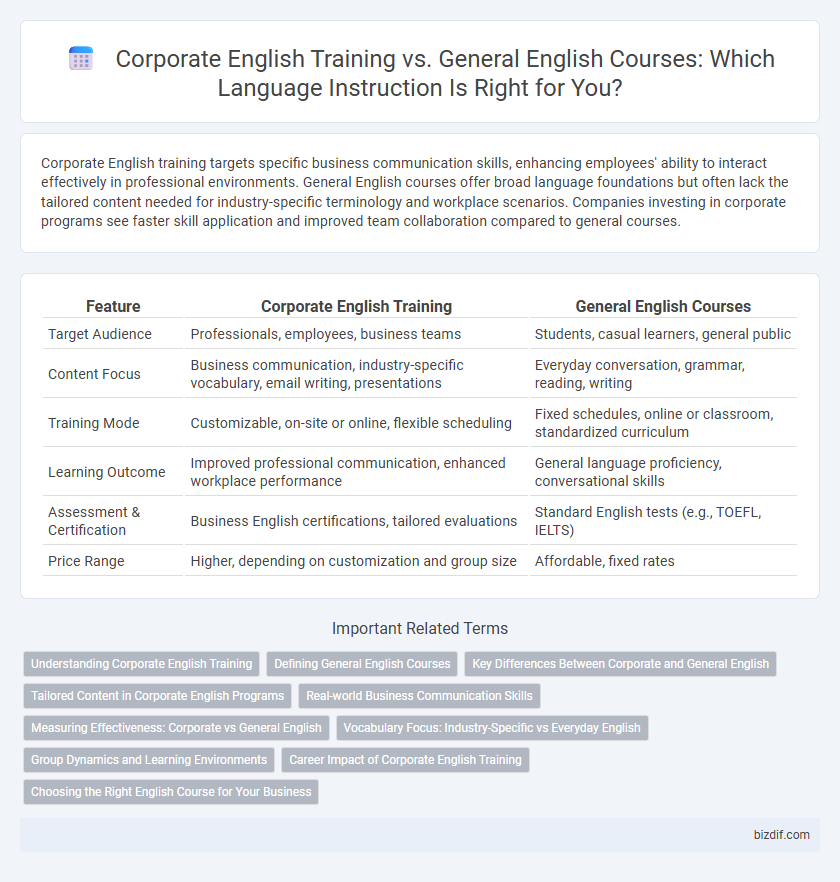Corporate English training targets specific business communication skills, enhancing employees' ability to interact effectively in professional environments. General English courses offer broad language foundations but often lack the tailored content needed for industry-specific terminology and workplace scenarios. Companies investing in corporate programs see faster skill application and improved team collaboration compared to general courses.
Table of Comparison
| Feature | Corporate English Training | General English Courses |
|---|---|---|
| Target Audience | Professionals, employees, business teams | Students, casual learners, general public |
| Content Focus | Business communication, industry-specific vocabulary, email writing, presentations | Everyday conversation, grammar, reading, writing |
| Training Mode | Customizable, on-site or online, flexible scheduling | Fixed schedules, online or classroom, standardized curriculum |
| Learning Outcome | Improved professional communication, enhanced workplace performance | General language proficiency, conversational skills |
| Assessment & Certification | Business English certifications, tailored evaluations | Standard English tests (e.g., TOEFL, IELTS) |
| Price Range | Higher, depending on customization and group size | Affordable, fixed rates |
Understanding Corporate English Training
Corporate English training targets industry-specific vocabulary, communication skills, and workplace scenarios, enhancing employees' ability to perform effectively in professional settings. Unlike general English courses, corporate training emphasizes business jargon, presentation skills, negotiation tactics, and email etiquette tailored to company needs. This specialized approach improves productivity, client interactions, and cross-cultural collaboration within international organizations.
Defining General English Courses
General English courses focus on developing fundamental language skills including speaking, listening, reading, and writing for everyday communication. These courses cover grammar, vocabulary, and pronunciation, tailored to build a solid foundation for learners at various proficiency levels. Unlike Corporate English training, General English courses emphasize broad language use rather than industry-specific terminology or professional contexts.
Key Differences Between Corporate and General English
Corporate English training targets specific industry terminology and business communication skills, while General English courses emphasize everyday vocabulary and grammar. Corporate programs often include role-playing common workplace scenarios such as meetings, presentations, and negotiations, enhancing professional interaction. General English focuses on broad language proficiency for social and practical use, lacking specialized vocabulary crucial for business environments.
Tailored Content in Corporate English Programs
Corporate English training offers tailored content that addresses industry-specific terminology, professional communication skills, and real-world business scenarios, unlike general English courses that provide broad language learning. Customized modules in corporate programs enhance employee productivity and meet organizational goals by focusing on relevant vocabulary and situational language use. This targeted approach ensures more efficient learning and immediate application of skills in a professional environment.
Real-world Business Communication Skills
Corporate English training targets practical language skills tailored to workplace interactions, emphasizing negotiations, presentations, and professional correspondence. General English courses cover broad language fundamentals without specific focus on business jargon or industry-specific scenarios. Real-world business communication skills gained from corporate training improve efficiency, client relations, and cross-cultural collaboration in professional environments.
Measuring Effectiveness: Corporate vs General English
Corporate English training often includes targeted assessments tailored to specific industry terminology and workplace communication skills, enabling precise measurement of employee progress and ROI. General English courses typically rely on standardized tests like TOEFL or IELTS, which evaluate broad language proficiency but may not reflect practical business usage. Metrics such as improved job performance, client interaction quality, and internal communication efficiency are key indicators of effectiveness unique to corporate programs.
Vocabulary Focus: Industry-Specific vs Everyday English
Corporate English training emphasizes industry-specific vocabulary tailored to sectors like finance, technology, and healthcare, enhancing professional communication and job performance. General English courses concentrate on everyday vocabulary used in daily conversations, travel, and social interactions. Specialized corporate programs improve understanding of jargon, acronyms, and technical terms critical for effective workplace communication.
Group Dynamics and Learning Environments
Corporate English training emphasizes tailored group dynamics that enhance workplace communication and team collaboration, unlike general English courses which often follow a one-size-fits-all approach. Learning environments in corporate programs are designed to simulate real business scenarios, fostering practical language use and immediate application. Group interactions in these settings promote focused skill development aligned with specific professional goals and organizational culture.
Career Impact of Corporate English Training
Corporate English training enhances career prospects by providing industry-specific vocabulary and communication skills tailored to professional environments. This targeted approach improves employee performance in meetings, presentations, and negotiations, leading to increased workplace confidence and opportunities for advancement. Companies investing in corporate language training often see higher productivity and better global business integration from their workforce.
Choosing the Right English Course for Your Business
Corporate English training targets industry-specific vocabulary, communication styles, and workplace scenarios to improve employee performance and professionalism. General English courses focus on broad language skills like grammar, vocabulary, and conversation suitable for everyday use. Selecting the right English course for your business depends on the specific goals, employee roles, and the need for tailored content that enhances business communication and operational efficiency.
Corporate English training vs General English courses Infographic

 bizdif.com
bizdif.com